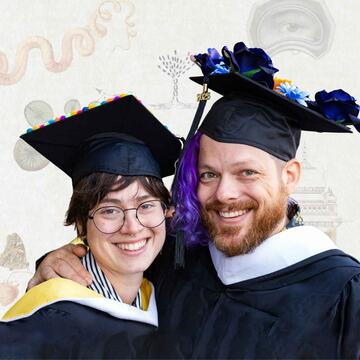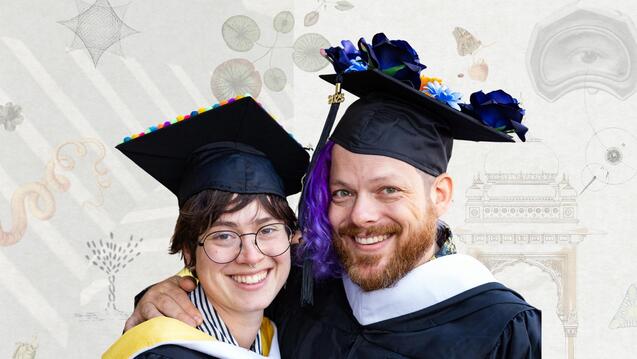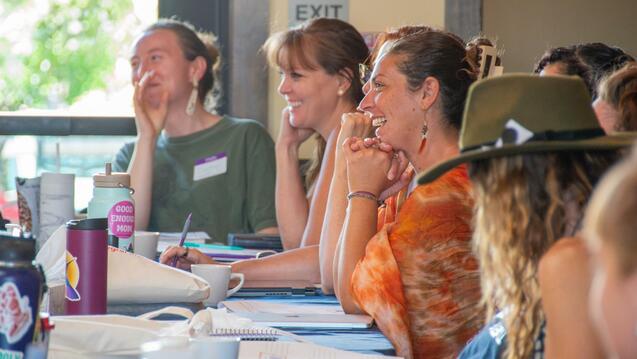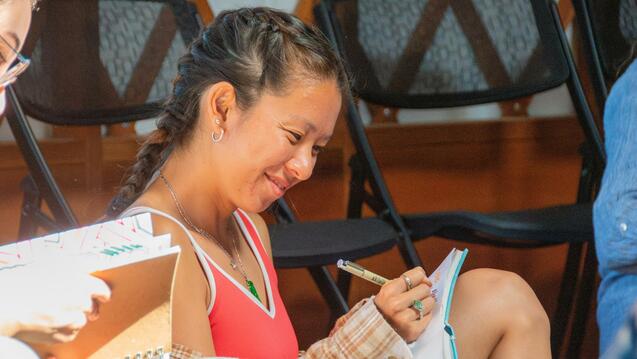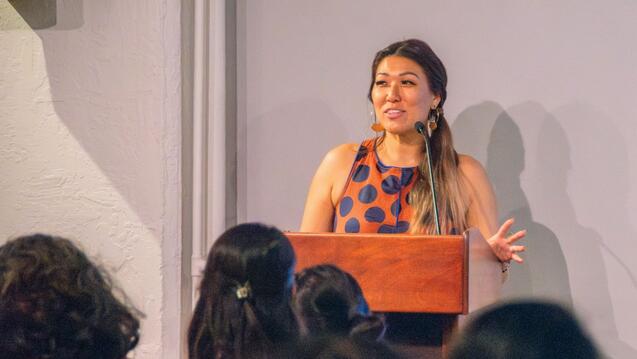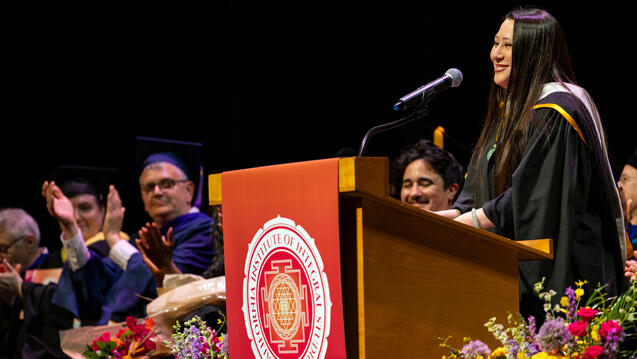Attend our in-person event on January 31 or online event on February 21.

Department of Counseling Psychology
A modern, holistic, and culturally sensitive approach to the practice of psychotherapy in one of five master's options
The Counseling Psychology department supports prospective clinicians who value a modern, holistic, and culturally sensitive approach to the practice of psychotherapy. Our master’s degrees reflect CIIS’ unwavering commitment to social justice, and the integral pedagogy of both classroom and clinical training is designed to ensure that students have the knowledge and skills they need to provide equitable, effective and compassionate mental health care.
Where Excellence Meets Empathy
Our integral approach has proven results.

5
cutting-edge programs

98%
pass rate on the MFT licensure exam

#1
for California pass rates over the last six exam cycles
Each of our five M.A. programs include broad training in psychological theory and methods while also providing program-specific coursework and training in specialty disciplines. We prioritize excellence in clinical skills, and diversity, inclusion, and social justice throughout the core curriculum.
The department is committed to advancing and promoting diversity, inclusion, and social justice throughout the core curriculum. As a pedagogic community, we work collaboratively to identify and challenge entrenched systems of racism, ableism, classism, sexism, homophobia, transphobia, and other forms of oppression in the classroom, clinical training situations, and therapeutic spaces.
All of our programs meet national norms for training in counseling and fulfill the educational requirements of California's Marriage and Family Therapy (MFT) license, or the optional Licensed Professional Clinical Counselor (LPCC) with additional coursework. CIIS graduates have a 98% pass rate on the MFT licensure exam and have held the #1 position in California for pass rates over the last six exam cycles.
Our graduates go on to work in private practice, hospitals and school settings, governmental agencies, community non-profits, and other clinical settings.
Explore our M.A. in Counseling Psychology Programs
Which one of our five unique specializations is right for you?
Focus on healing through social justice and structural change
Utilize drama and theatre to promote psychological health
Integrate creative expression with clinical and community practice
Incorporate the mind, body, and spirit into therapeutic practice
Bring an embodied approach to whole-person healing
Faculty Research and Scholarship
Our faculty have a wide range of research interests, including trauma and recovery, gender and cultural identity, and mindfulness-based therapies.

On Family Constellations Therapy
Family Constellations begins with this premise—it did not start with me. Many of us become entangled with the unhappiness of those who came before us, unconsciously adopting destructive familial patterns of anxiety, depression, failure, and even illness and addiction.
CIIS faculty in Expressive Arts Therapy Mimi Savage joins Marine Sélénée for a conversational introduction to Family Constellations and how we can all harness this philosophy to take ownership of our lives.

On Building a Values-Driven Healing Practice in a Profit-Driven World
Listen to an episode of the CIIS Public Programs Podcast in which licensed psychologist and CIIS faculty Elizabeth Markle talks with somatic psychotherapist, author, and podcaster Laura Mae Northrup about her latest book, Radical Healership, which offers an authentic, spiritually grounded approach to finding a true path to working in a healing profession.

On Why Anxiety Can Be Good For You
Listen to this talk with Somatic and transpersonal psychotherapist Deanna Jimenez talks with Dr. Dennis-Tiwary about her latest book, Future Tense. Dr. Dennis-Tiwary's work and writing addresses both generalized anxiety—which we all face—and anxiety disorders, when our anxious reactions and feelings prevent us from functioning effectively. In this talk they explore looking at anxiety in a new way to offer hope to those suffering from it along with a way forward to better managing anxiety to spark creativity and joy for a more productive life.
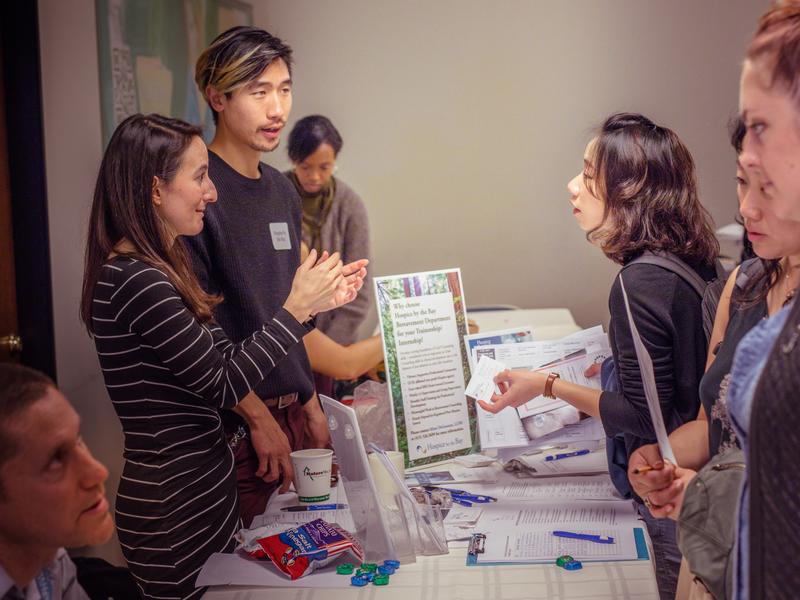
Field Placement Office
The MCP Field Placement Office supports the clinical training component for the five Master of Arts in Counseling Psychology programs at CIIS. Our office has approved more than 200 sites throughout the San Francisco Bay Area and beyond, where students in each of our M.A. programs can serve as trainees working with diverse populations in settings that include mental health clinics, hospitals, schools, and a variety of clinical social service settings.
Learn About Our Clinics
Learn About Our Clinics
Mind-Body-Spirit Healthcare
The CIIS counseling centers offer a supportive environment for our students to learn as well as affordable and effective mind-body-spirit psychotherapy to thousands of people each year.
FAQs
-
CIIS takes a relational approach to therapeutic training. We view the therapeutic relationship as the cornerstone of the therapy process. Our counseling programs view pathology as often an attempt of the psyche to fill in relational gaps in early childhood, or as the result of othering experiences such as racism, trauma and oppression. If our psychic structures (even maladaptive ones) are formed through relationship, then it is through relationship we heal and create new, more loving, liberated and vital views of self, other and world.
Clinical training at CIIS moves this approach beyond theory to include experiential training models in both the classroom and in the practicum experience. We give our students the tools that are specific to their program of choice, such as Expressive Arts Therapy, Drama Therapy, community focus and liberation psychology (Community Mental Health), body-centered therapy (Somatic Psychology) or contemplative and transpersonal views (Integral Counseling Psychology).
-
The professional practice of counseling is a regulated occupation in the state of California. Coursework in the Master of Arts in Counseling Psychology program at CIIS and each of its five programs is approved by the California Board of Behavioral Sciences (BBS) to fulfill educational requirements toward the marriage and family therapist license (LMFT). Students also have the option to take additional coursework to fulfill the educational requirements of the professional clinical counselor license (LPCC). Students seeking the LPCC license also take courses for the LMFT, enabling them to pursue either license and to work with couples, families, and/or children as an LPCC. Students seeking licensure in California as an LMFT or LPCC must register with the BBS after graduation and successfully complete additional post-graduate supervised clinical associate hours and written examinations. See the BBS site for additional information.
-
While CIIS does not currently offer any fully online M.A. in Counseling Psychology programs, we do have programs that support students for low-residency and weekend formats.
Our low-residency options are:
Weekend formats are offered through three programs:
- Community Mental Health
- Integral Counseling Psychology (On-Campus)
- Integral Counseling Psychology (Hybrid)
Please note: Given certain state restrictions, Expressive Arts Therapy applicants must live in CA throughout the entirety of their program, and weekend format students must live in one of the approved states - CA, OR, NV, or WA. Visit our State Authorization page for more information.
-
In many cases, our coursework and training is very similar or entirely portable to many states. However, each state has their own specific licensure requirements that include both academic coursework and clinical practicum hours that may differ from CA’s requirements. In cases where this program does not meet the requirements for another state, additional coursework or practicum hours may be required. While licensure may be possible in another state, it is not guaranteed. Luckily, you will have the full support of a Director who will help you understand the specific licensing requirements. Lastly, you should consult the licensing boards of the appropriate state of country for the most up-to-date licensing information outside of California.
-
Each of our programs prepare students with sound clinical skills that apply to clinical work in a variety of settings. The best fit for you will depend on past experience, background, current areas of interest, and future career goals.
Find out more about each of our programs by visiting their pages:
- Community Mental Health
- Drama Therapy
- Expressive Arts Therapy
- Integral Counseling Psychology
- Somatic Psychology
You can also sign up for an Info Session to find out more.
-
Graduates from CIIS with a Master’s in Counseling Psychology degree pursue a variety of careers including: private practice, hospitals and school settings, governmental agencies, community non-profits, and other clinical settings.
Licensed graduates are welcome to provide our Alumni Relations Office with their professional contact details to be added to our CIIS Trained Therapy Referrals list.
-
CIIS works with over 200 clinical training sites in the Bay Area and beyond. Our Field Placement Office is happy to provide information and advice about finding the best practicum site for you.
Our Upcoming Events
An Online Overview with Jennifer Gruczelak and Ronda Sharp
A Faculty-Led Info Session with Chevon Stewart


Our Department in Action
Discover your fit among CIIS' five counseling psychology concentrations, each offering a unique path to becoming a transformative healer.
Inside CIIS’ bold approach to community mental health and healing-centered education.
Integral Counseling Psychology M.A. graduate Marissa Huang gave one of two student speeches at CIIS’ 57th Commencement Ceremony.


